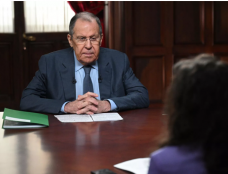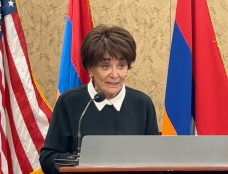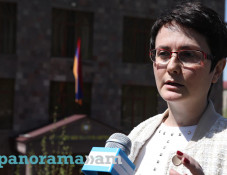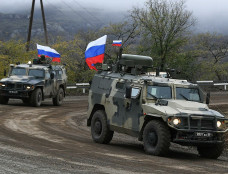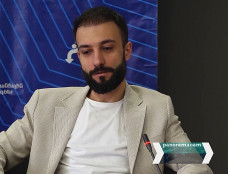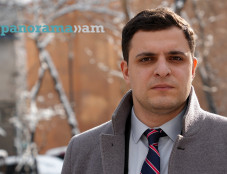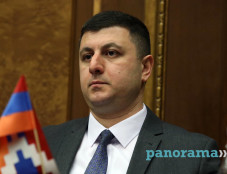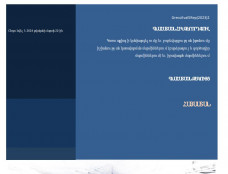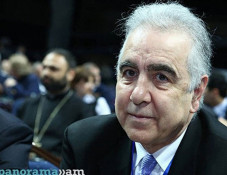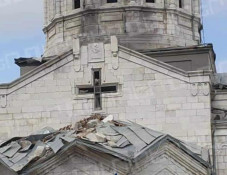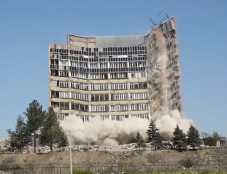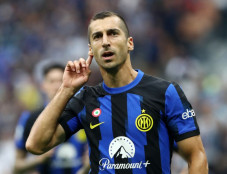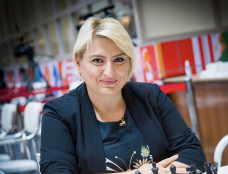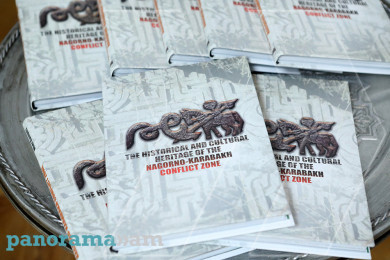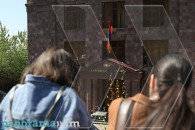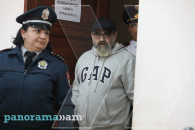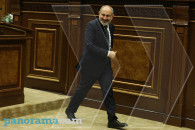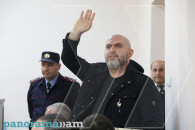
Blood & oil: Turks, Kurds, and the Islamic State
By Dr. Can Erimtan, RT
Over the past month the Islamic State's siege of Kobani (aka Ayn al-Arab) has been dominating the world news coverage, revealing Turkey's fraught relationship with its own Kurdish minority and with Kurds and Kurdish organizations across the wider region.
Particularly, the Turkish Army's continued waiting game on the Syrian border has outraged Kurds and others the world-over. But President Obama's recent telephone intervention seems to have forced Tayyip Erdogan's hand. The US President seems to have indicated that Turkey would be blamed for the fall of Kobani, as asserted by the Turkish newspaper Radikal.
Prior to this sample of telephone diplomacy, President Erdogan said publicly that the Syria-based Kurdish PYD (or Democratic Union Party) “for us is equal to the PKK. It is also a terrorist organization," (19 October) thereby linking Turkey's decades-old fight against the terror group PKK (or Kurdish Workers Party) to recent events in Syria involving the PYD and the IS. On Monday 20 October, passing through Turkish air space, the US started its first air drops of some 21 tons of weapons, ammunition and medical supplies into the besieged city.
Turkish authorization of the use of its air space led Foreign Minister Mevlut Cavusoglu to declare his country's willingness to aid and support the Kurdish effort to resist the IS onslaught. The FM then continued by announcing that Turkey would now also allow Iraqi Peshmerga fighters to cross its territory via a predetermined corridor in order to relieve and support the fighters of the besieged Syrian town just across the border. Cavusoglu announced that "Turkey never wanted Kobani to fall, and still does not want it. In order to avoid this Turkey has displayed all kind of efforts, and has secured the delivery of all kinds of humanitarian and medical aid. Turkey has scrupulously adhered to all of its rules of engagement and has become a member of the coalition in full cooperation.” Turkey can thus be seen to facilitate Kurdish cross-border cooperation: as armed forces of the KRG (or Kurdistan Regional Government in Northern Iraq), the Peshmerga, are crossing into Turkey bypassing territories held by the IS, in order to aid fighters of the PYD holding sway over Rojava (autonomous Kurdish region in North-Eastern Syria) in the city of Kobani.
The KRG and Rojava
At the same time, another kind of narrative is now also being developed in the Turkish media, as reports have appeared which indicate that Recep Tayyip Erdogan has declared that "I actually made this offer [of a corridor for Iraqi Peshmerga] to President Obama during our telephone conversation . . . The step to take here is a cooperation with the Free Syrian Army.” In this way, the Turkish President appears to utilize the Turkish media to suggest that the Iraqi Peshmerga should now form an alliance with the FSA in an effort to save Kobani, integrating the Kurdish PYD into the anti-Assad coalition and distancing the organization from the PKK, which is recognized as a terror organization. In this way, the Turkish President appears to be pushing the Turkey-supported anti-Assad FSA as the real player in Syria's not-so civil war, while diverting domestic attention from the IS and the Kurdish presence in Syria (and beyond). Erdogan's suggestion appears particularly strange given the PYD's well-known links to the Damascus regime. Abdurrahman Saleh, apparently a one-man media office of the Army of Islam (another Islamist fighting unit in Syria), stated in this context that "they [meaning, the Kurdish PYD] work hand in hand with the Assad regime; they are like Assad militias,” adding insightfully that "the Kurds did not participate in the revolution. They just want a Kurdish state.” Recently, the Kurdish National Council in Syria organized a meeting of Kurdish parties in Dohuk (KRG, Iraq) to unite the disparate political forces in Rojava, chaired by Massoud Barzani, the President of the KRG. After all, some weeks ago Barzani declared that "we are fighting a terrorist organization that possesses the capabilities of a state and the Peshmerga is currently the only force that is standing in the face of IS and stopping its advance.” And now, it turns out that the IS is attempting to take the border crossing of Mursitpınar facing Kobani, in an effort to thwart the Peshmerga relief effort. While, the "Free Syrian Army (FSA) has decided to send 1500 troops to the Syrian Kurdish town of Kobani to fight against ISIS militants,” as reported by the pro-government Turkish paper Daily Sabah.
Sykes-Picot and underground assets: The new Palestinians
Now that Turkey has apparently half-heartedly joined the Kurds in their efforts to defeat the threat posed by the Islamic State, it would stand to reason that the notion of an independent Kurdish state has been put on the backburner. Still, the KRG President nevertheless said that "at the moment the Kurdish priority is fighting IS but our right to self-determination is something that nothing can take away.” The Kurds have now clearly become the Palestinians of the 21st century as the other ethnic group (or nation, if you will) to lack its own sovereign state and thus deserving international sympathy and goodwill, and significantly in possession of vast amounts of oil and gas. In the aftermath of the Great War (better-known as World War I, 1914-18) and the application of the Sykes-Picot agreement (1916), the map of the Ottoman Empire (or the Middle East) was divided between Europe's imperial powers into territorial units that eventually became sovereign states in possession of varying degrees of hidden hydrocarbon assets. Turkey as the direct successor of the Ottoman state was the only sovereign unit lacking in sufficient amounts of hidden hydrocarbon wealth. The one nation state to emerge with an abundance of underground assets was Iraq. In 2003, then- US Deputy Defense Secretary Paul Wolfowitz famously called it a land that "swims on a sea of oil.” Iraq possesses the world’s fifth largest proven oil reserves with an estimated 140 billion barrels. The Islamic State has now appeared on the scene to ostensibly establish a new Caliphate uniting Muslims worldwide and threatening Western interests locally. The Bush occupation of Iraq was meant to secure easy corporate access to Iraqi oil and gas, but now this easy fix has been disrupted, with the IS occupying large swathes of oil-rich lands (IS oil production is estimated to be worth $800 million per year, according to a report compiled by the a global information company IHS). But the KRG has fought back and is now consolidating and expanding its own underground assets. The consultancy firm Iraq Oil Report's Kurdistan Correspondent Patrick Osgood declared recently that the KRG "is racing to expand the capacity of its oil refineries – a critical step toward addressing weaknesses in the KRG's oil sector and economy. Kurdistan's two major refineries, near Erbil and Sulaimaniya, process just over [a meager] 15.3 million liters, 96,000 barrels, of oil a day, according to figures for January [2014] released by the region’s Ministry of Natural Resources.” Last January the Iraq Oil and Gas Strategic Report disclosed that nine new exploration fields have been documented in the territory of the KRG. It therefore does not appear surprising that President Massoud Barzani has been so outspoken about (Iraqi) Kurdish independence over the past months. Fighting the IS, the KRG also managed to occupy oil-rich Kirkuk (11 July 2014) and Barzani has stated on the record that "Kirkuk will be included in the referendum and the people of Kirkuk themselves will decide,” much to the dismay of the Baghdad government.
Turkey's Kurdish Peace Process
Even though the discourse of religion and to a lesser extent nationalism appears to dominate people's thoughts and actions all across the Middle East, the oil argument always remains an unspoken yet important part of the puzzle that is the Sykes-Picot legacy that has determined the shape of the region's states and constituencies. The domestic scene in Turkey has been very much dominated by nationalist or ethnic arguments in the wake of the PKK's war against the Turkish state that started in 1984. This armed confrontation has led to the deaths of about 40,000 people in Turkey; and, in 2009, the government led by the self-proclaimed Muslim-Democrat Justice and Development Party (or AKP) launched it “Kurdish Overture” (Kurt Acılımı), inching towards reaching some sort of final settlement that would end in the peaceful cohabitation of Kurds and Turks. In 2013, the PKK's imprisoned leader Abdullah Ocalan joined the national conversation by means of a public broadcast: "Let guns be silenced and politics dominate . . . The stage has been reached where our armed forces should withdraw beyond the borders . . . It's not the end. It's the start of a new era.” Subsequently, a ceasefire was put in place that has held till recently. Still, Turkey's rulers appear determined to stay the course. Turkey's Prime Minister Ahmed Davutoglu, while acknowledging the negative effects of recent developments in Iraq and Syria, told the press optimistically that "the desired goal [of the peace process] can be reached within a few months,” if the parties concerned stick to their program.
In this context, Turkey's relations with the KRG are of the utmost importance. On the one hand, hundreds of Turkish companies have a presence in Northern Iraq. In 2013 a leading Fathi Mohammed al-Mudaris, adviser to the KRG Trade and Industry Ministry proclaimed that “Turkey is the main source for most imports to the Kurdistan region.” On the other, last year another addition to “Pipelineistan” was finished with the completion of a new line connecting Kurdish oil fields to Turkey. Turkey has been a destination for the KRG's oil exports since early last year, with the Turkish port of Ceyhan acting as a conduit for the wider commercial dissemination of Kurdish oil. Even the IS onslaught was not able to disrupt this process, leading Turkish Energy Minister Taner Yıldız to declare earlier this month that the "rate of crude oil flow from the Kurdistan Region to the port of Ceyhan reached 240,000 barrels per day (bpd) since the beginning of the week [of 13 October].” In this way, Turkey continues to pursue its goal of becoming a regional energy hub. Sherko Jawdat, the head of the energy committee in the Kurdish parliament, has indicated that the KRG has earned approximately $1.3 billion from selling 14 million barrels of oil from February to September 2014. These commercial interactions show that Turkey and the KRG have become dependent upon one another, as the KRG continues to develop its underground assets; Barzani's government relies on Turkey to act as its agent and connection to the outside world. And, within this framework, one should also understand Turkey's recent U-turn on the Peshmerga. While at the same time, Turkey's continued goodwill towards the apparently somewhat disrupted peace process apparently aims to secure the KRG's continued commitment to further Turkish ambitions of becoming an energy hub.
In this way, the Turkish peace process and the Kurdish fight against the IS have become intertwined.
Newsfeed
Videos





